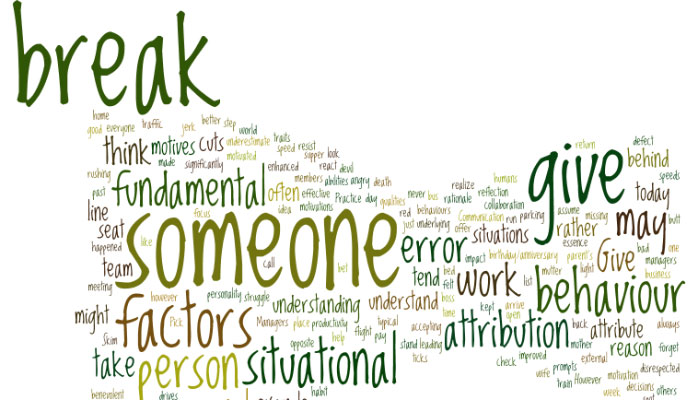 Managers and supervisors often struggle to understand the motivation and rationale behind employee behaviours. When those managers also own the business, the fundamental attribution error often drives decisions rather than the effective habit of “seeking to understand”. Communication, team work and collaboration are significantly enhanced leading to improved productivity from team members when the fundamental attribution error is kept in check. Give someone a break today and be more benevolent.
Managers and supervisors often struggle to understand the motivation and rationale behind employee behaviours. When those managers also own the business, the fundamental attribution error often drives decisions rather than the effective habit of “seeking to understand”. Communication, team work and collaboration are significantly enhanced leading to improved productivity from team members when the fundamental attribution error is kept in check. Give someone a break today and be more benevolent.
What is the fundamental attribution error?
In essence, when we look for motivations behind behaviour, we, as humans, attribute the behaviour to an underlying reason. When we think about others, we tend to overestimate the impact of personal factors (traits, abilities, motives, etc.) and underestimate the situational factors. We do the opposite when we think of ourselves.
I always have a good reason for my behaviour. The devil made me do it; however, you have a personality defect. If everyone were more like me, the world would be a better place.
For example, when someone speeds past you and cuts you off in traffic, you may react “What a jerk.” You assume this behaviour is typical. However, it might be that this person never cuts in line and may be motivated by other situational factors – for example, missing a flight to arrive at a parent’s death bed. When someone would speed by my mother, she would mutter, “I bet he’s not rushing home to help his wife with supper.”
Practice
Pick one or 2 situations that happened this week when you felt disrespected. What were they? What motives did you attribute to the behaviour? Are there situational factors that could have been at work? Skim the list of 10 situations below for reflection prompts.
- Why didn’t someone return your call?
- Why did someone stand you up at a meeting?
- Why did someone forget your birthday/anniversary?
- Why did someone butt in front of you in line?
- Why did someone take that parking spot?
- Why did someone take that seat on the train / bus?
- Why did someone offer a seat to that person?
- Why did that person pay for my drink?
- Why did that person run a red light?
- Why is that person homeless?
If you take a step back and realize the fundamental attribution error may be at work, you are more understanding and more open to accepting the idea that someone might just be having a bad day.
So the next time your employee or your boss ticks you off, resist your original angry response and think about situational factors that may be at work. Give him / her a break today!

Comments are closed